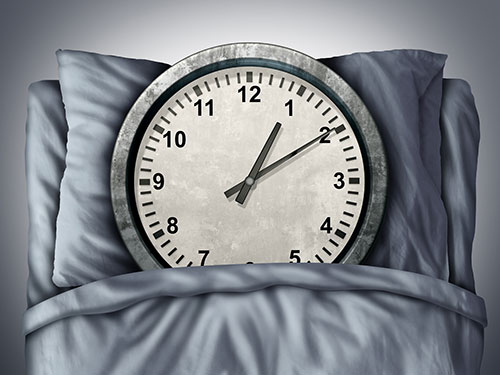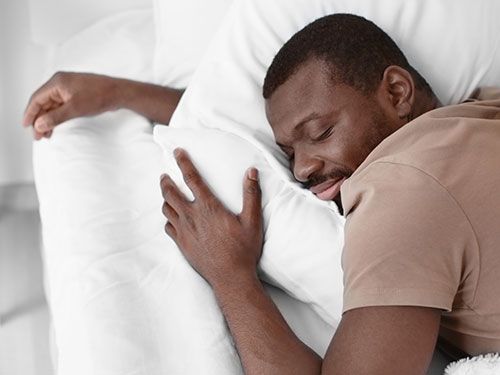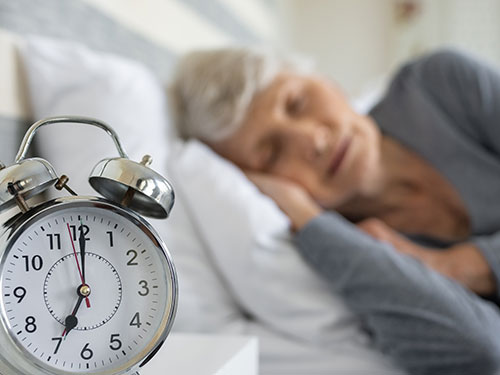
Fact Sheet FS1373
Sleep is essential to both physical and mental well-being. It restores and recharges the body and mind to make you feel refreshed and focused. Yet, many Americans do not get the amount or quality of sleep they need. Lack of sleep strains mental abilities and puts physical health at risk. If you are not able to get good quality sleep for a prolonged period, consult a doctor. If you experience short-term sleep disruption or irregular sleep that comes and goes, make lifestyle changes for better sleep health to build a better night's sleep.
Each person's body follows a natural sleep cycle based on the Earth's rotation. This cycle, called the circadian rhythm, uses light and dark signals to cue the body to sleep or wake up, and assists with creating a sleep pattern. Circadian rhythm is controlled by a "biological clock" that is primarily located in the brain. The brain receives input from light sensors in the eyes and helps regulate the release of hormones, body temperature, and other bodily functions that follow a 24-hour cycle. Circadian rhythm regulates sleep, hunger, and energy levels. It is the body's internal clock, and it regulates physical, mental, and behavioral changes that occur over a 24-hour cycle. Both environmental and behavioral factors can alter circadian rhythm, and this can affect waking up, going to sleep, and metabolism.
Sleep Stages
There are various sleep stages during the night that intertwine with the circadian rhythm. Understanding these sleep stages may assist with building a better night's sleep:
Rapid Eye Movement or REM: The name REM is derived from how the eyes move behind the eyelids while sleeping. During REM, the body undergoes beneficial changes that create a feeling of restfulness upon waking. Changes take effect on our bodies and mind during REM. Eyes move quickly, breathing becomes fast and irregular, heart rate increases to about walking level, body temperature changes, blood pressure can increase, the brain increases oxygen, and the face and limbs can twitch. REM sleep can last for up to 60 minutes and is intermittent during the night. It supports learning, memory, and mood, which is why a good night's sleep helps the body learn, think, and feel better.
Non-Rapid Movement Eye Movement or non-REM: Non-Rem sleep allows the body to rest and restore and is an important part of a healthy lifestyle. Non-REM sleep begins prior to entering the REM stage of sleep and occurs in phases throughout the night. There are four stages of non-REM sleep. In the first, people are awake or in a light sleep. The second stage is a deeper sleep. This is when heart rate and body temperature start to fall. In the third and fourth stages, muscles begin to relax and blood flow to muscles increases; this is where the body starts to repair and grow tissue. These phases help to replenish and store energy, and hormones are released. The amount of non-REM sleep that a person gets decreases with age. People under 30 usually get 2 hours of restorative sleep per night while those over 30 might get only 30 minutes per night.
How Much Sleep Do I Need?
Sleep needs do change over the course of a lifetime. Children and adolescents need more sleep than adults. Babies require more sleep because they are growing and developing. They sleep between 16–18 hours per day. School-aged children and teenagers need about 7–9 hours of sleep per night because they too are growing and developing, although not as much as babies. The American Academy of Sleep Medicine and the Sleep Research Society recommend 7–8 hours of sleep per night for most adults. Older adults need about the same amount of sleep as younger adults but may sometimes have trouble sleeping due to medications or lower melatonin production in the body. After age 60, sleep may become shorter, lighter, or more interrupted.
The Importance of Building a Better Sleep Routine
People who are chronically sleep-deprived are more likely to be at risk for being overweight, stroke, cardiovascular disease, infections, and certain types of cancers, according to the National Institute of Neurological Disorders and Stroke. There are also studies underway to determine if there is a relationship between sleep and neurodegenerative diseases such as Parkinson's disease and Alzheimer's disease. Emotional health can also be impacted by lack of quality sleep, and there is a connection between sleep and emotional brain function.
Most people recognize the feeling of rejuvenation after a quality night's sleep, but getting a better night's sleep may require lifestyle changes. Build a better night's sleep by trying these strategies. Keep in mind that habits take some time to take effect; allow about 6 weeks to turn a routine into a healthy habit.
- Set a regular bedtime and wake up time. Make a schedule to go to bed and wake up at the same time each day and night to signal your body for better sleep. The circadian rhythm that signals light and darkness to assist with sleep patterns will be well supported if your body is on a schedule.
- Enjoy the benefits of regular physical activity. Make sure to exercise or be physically active every day. The Physical Activity Guidelines for American's recommend that adults get 150 minutes of moderate to vigorous cardiovascular movement per week and 2 additional days of strength training per week. While it is good to move to expend energy and burn calories, be aware of when you exercise. Moving 2–3 hours before bed may make it hard to settle down; plan exercise at a time that will not interfere with falling asleep at night. Thirty minutes of movement per day could be a fun and easy way to sleep better.
- Eat nutrient-dense meals. Eating from the five food groups (protein, whole grains, fruits, vegetables, and dairy) supports a healthy weight and assists with preventing chronic disease. Foods that are high in fiber, vitamins, and minerals paired with adequate protein may improve sleep, as well. The timing of meals can also impact sleep. A healthy sleep routine should include a regular eating schedule. Eating meals at different times each day can confuse the body's clock, making it harder to maintain regular sleep and wake schedules. Instead, plan a light dinner 2–3 hours before bedtime to help the body slowly ease into sleep mode. Heavy meals at night can disrupt sleep.
- Avoid or reduce caffeine. Avoid drinking coffee, tea, caffeinated soft drinks, and energy drinks after 2 p.m. as the effects of caffeine can be observed six hours after intake. Caffeine is a stimulant that elevates energy levels, making it difficult to fall asleep. Avoid caffeine altogether if you have a hard time falling asleep or wake up frequently during the night.
- Avoid nicotine. Nicotine is a stimulant that can disturb sleep and result in lower quality sleep. It can disrupt sleep patterns, resulting in sleeping fewer hours; make it harder to fall asleep and/or stay asleep; and lessen the quality of sleep, including insomnia, irregular circadian rhythms, and restless sleep. Nicotine can also increase the risk of sleep problems like snoring, obstructive sleep apnea, and daytime sleepiness, which can cause people to feel tired during the day. Visit tobaccofreenj.com/quit-smoking to learn more about resources to eliminate tobacco.
- Limit alcohol consumption. Although it may help some people fall asleep faster, alcohol can lead to lower quality sleep and more frequent overnight awakenings.
- De-stress. Stress can cause short-term or long-term sleep disruption; managing stress levels is important for better sleep habits. During the day, take time to reduce stress in your life and make time for relaxation. Exercise, a favorite hobby, meditation, and deep breathing are all excellent strategies to reduce stress. Take a break during the day to calm down or quiet your mind at bedtime.
- Make your sleep area "sleep ready." Find a comfortable and welcoming place to sleep each night and make that space just for sleeping. If your home office is in your bedroom, be sure to declutter and organize your workspace so you are not lying in bed looking at a messy work area. Turn off computers and phones in the bedroom to avoid disruptive noises. If there is light in your sleeping space, get black-out curtains to make sure your body gets the message that it is nighttime and time to sleep. Make sure that the temperature in the room you sleep in does not cause you to wake up at night, adjust the temperature as needed for optimal sleep. Avoid falling asleep while watching television and go to bed when you feel yourself dozing off. Make sleep consistent and in the same place every night to set a comfortable routine. Making your bed and bedroom sleep-friendly will signify to your body that it's time to get a good night's rest.
- Unplug from electronics. Turn off all technology a few hours before settling in to get a better night's sleep. Leave devices plugged in somewhere other than the bedside or silence devices to avoid noises and lights. Avoid television shows that might cause stress before bed.
- Change things. If you can't sleep, try getting up and doing something to relax your mind. Lying awake can be frustrating and it may be helpful to get up and change your position or find something to make you sleepy, like a warm bath or reading a book. If you have a hard time falling asleep due to a wandering mind, try to redirect yourself. For instance, count sheep or focus your attention on an object floating in the wind like a leaf or piece of paper. Allow the leaf to float up with the wind and then travel and float. Keeping this movement in your mind will redirect the thoughts that keep you awake. If the disruptive thought comes back to mind, recognize it and push it aside and go back to the floating leaf or counting sheep. If you awaken in the night, try redirecting your mind to something that brings you pleasure so it eases you back to sleep.
Building a better night's sleep is key to improving overall health. It boosts mental clarity, strengthens the immune system, and supports emotional well-being. By prioritizing quality sleep, you can enhance productivity, improve mood, and enjoy a healthier, more balanced life. By incorporating these sleep-enhancing tips into your daily routine, you can foster a more restful and rejuvenating sleep experience. Taking control of your sleep habits will not only improve your overall well-being but also help you feel more energized and focused throughout the day.
References
July 2025
Copyright © 2025 Rutgers, The State University of New Jersey. All rights reserved.
For more information: njaes.rutgers.edu.
Cooperating Agencies: Rutgers, The State University of New Jersey, U.S. Department of Agriculture, and Boards of County Commissioners. Rutgers Cooperative Extension, a unit of the Rutgers New Jersey Agricultural Experiment Station, is an equal opportunity program provider and employer.



